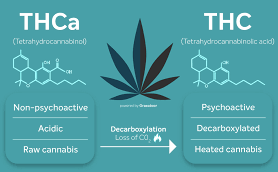What a tangled web they weave would be my main comment at this juncture!
MM do their best to explain the inexplicable!
To meet the federal definition of hemp under the 2018 Farm Bill, a cannabis product must contain less than 0.3 percent delta-9 THC. Now, in a new letter clarifying that limit, a top Drug Enforcement Administration (DEA) official says the threshold includes not only delta-9 THC itself but also the related cannabinoid THCA, which is converted into delta-9 THC when heated—a process known as decarboxylation.
“In regards to THCA, Congress has directed that, when determining whether a substance constitutes hemp, the delta-9 THC concentration is to be tested ‘using post-decarboxylation or other similarly reliable methods,’” says the letter, sent earlier this month by Terrence Boos, chief of DEA’s drug and chemical evaluation section.
“The ‘decarboxylation’ process converts delta-9-THCA to delta-9-THC,” Boos continued. “Thus, for the purposes of enforcing the hemp definition, the delta-9 THC level must account for any delta-9 THCA.”
“Accordingly, cannabis-derived THCA does not meet the definition of hemp under the CSA,” he concluded, “because upon conversion for identification purposes as required by Congress, it is equivalent to delta-9-THC”
The position articulated in the May 13 letter comes in response to a request for clarification sent to DEA last month by cannabis attorney Shane Pennington, who declined to comment for this story. According to the DEA letter, Pennington last month “requested the control status of tetrahydrocannabinolic acid (THCA) under the Controlled Substances Act.”
A similar request from Pennington, a lawyer at the firm Porter Wright, was also the impetus for DEA’s declaration in 2022 that marijuana seeds are considered legal hemp as long as they don’t exceed federal THC limits.
Read the full article


















